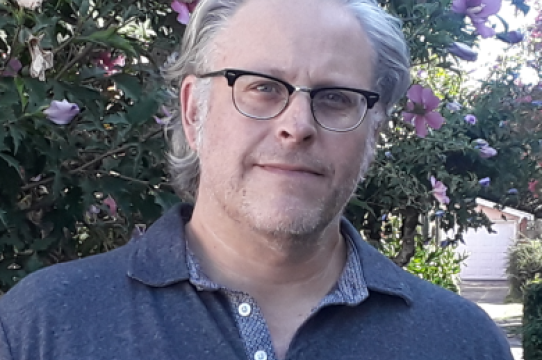Martin Rizzo-Martinez is nothing if not a busy person. The first-year assistant professor of film and digital media currently has projects in the works including the second season of his podcast, Challenging Colonialism, and creating a documentary.
Right now Rizzo-Martinez is looking forward to the publication of the paperback edition of his book, We are not Animals (University of Nebraska Press, 2022). “It's basically a history of indigenous peoples of Santa Cruz, and it traces back from before the arrival of the Spanish missions,” says Rizzo-Martinez. “It follows how the indigenous peoples navigate and find ways to survive through consecutive colonial eras: the missionary era, and then the Spanish or the Mexican National Era, and into the American era.” The book ends right around the year 1900.
The paperback edition of We are not Animals, which was recently released, features updated reviews as well as awards. Last year the book won the Western History Association’s John C. Ewers Award and the American Library Association’s Choice Outstanding Academic Title award. The paperback will also be more accessible and affordable for a wide audience.
To Rizzo-Martinez the biggest success of We are not Animals has been the reviews, particularly from indigenous peoples who relate to the book. “The tribal members have really appreciated it,” says Rizzo-Martinez. “A big part of the book is the incorporation of feedback from tribal members. I really tried to center it on the perspectives of hunted indigenous peoples.”
Rizzo-Martinez moved to Santa Cruz many years ago and stayed here; later getting his Ph.D. on the history of indigenous people in the area from UC Santa Cruz. “It's really unusual for somebody to get a Ph.D. in a place and end up there,” he says, adding “working at UCSC is a dream job.”
Between receiving his Ph.D. and becoming a faculty member he worked on staff as well as with the California State Parks as the historian and tribal liaison. He still has projects in the works with the parks department including a video featuring native peoples talking about their heritage in the region.
Along with teaching, Rizzo-Martinez is also in the process of creating a documentary, The Walk for the Ancestors. It follows a movement from 2015, the year in which the Catholic Church made Junípero Serra a saint, in which many native families walked from mission to mission in protest. The film is not set to come out for a while, but Rizzo-Martinez still has plenty to keep him engaged.
Almost at the end of his first year of teaching, Rizzo-Martinez has enjoyed spending time in the classroom with undergraduates. “It's really kind of been an adventure in teaching,” he says. “This quarter I'm getting to teach my first graduate course for students in the Social Documentary program. It's an awesome experience to be able to work with these really creative grad students who are doing amazing projects on their own, and I get to help them out but also learn about their own work.”
May 2024


